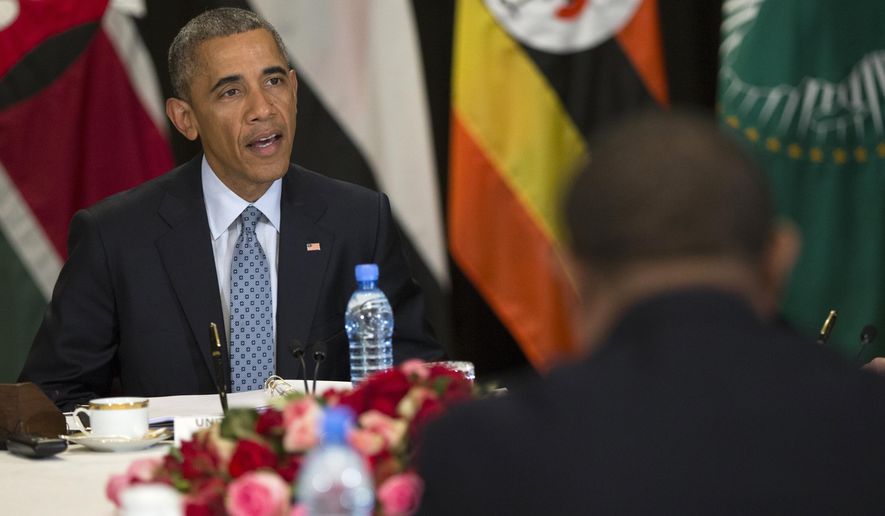OPINION:
Critics of President Obama’s Iranian nuclear agreement believe his position is that any deal is better than no deal. He seems to be taking that same stance in dealing with the horrifying civil war in South Sudan, a largely Christian nation that won independence in 2011 as it broke away from the Arab-dominated Sudan government.
Mr. Obama personally intervened in the conflict last month during his trip through Eastern Africa. He got several African leaders to support sanctions against individuals and institutions involved in the civil war if both sides don’t agree to the internationally crafted draft of a peace deal by Aug. 17.
On the one hand, U.S. involvement is desirable because the 20-month-long civil war has displaced one out of six of South Sudan’s 12 million people. Food aid is in short supply. The United States was the major player behind convincing Sudan (and their African and Arab allies) to allow for an independence vote, so it has a moral obligation to help heal wounds.
But sanctions now look like a feel-good approach for a country that needs the tough work of forging a common identity for the tribally divided South Sudanese. They may convince the Obama administration and others that “something” is being done, but they are a far cry from the real work that is needed — building a sense of nationhood and creating structures that involve people at the local level.
For starters, peace cannot be forced upon warring parties — particularly in a matter of just weeks. Israel and its Palestinian opponents have seen 70 years of conflict. That should be a stark reminder of the limits of such an approach.
Secondly, Mr. Obama presumes that the current draft of the peace deal can be forced on both factions. The deal Mr. Obama is insisting on is a jury-rigged approach that gives both the South Sudan government of President Salva Kiir and the rebels led by former Vice President Riek Machar equal seats at the ruling table. This is not only a recipe for dysfunction — it encourages any faction that cannot win an election to take up arms in rebellion. A peace deal that fails could move the parties farther from each other than they are now.
The big thing all factions in South Sudan did agree on before declaring independence in 2011 was that they opposed the Arab regime in Khartoum that ruled them. Post-independence, too little effort went into building trust and mutual respect between groups and creating the strong institutions that democracies require — institutions that check the greed and ambitions of individual power players. As U.N. Undersecretary-General for Political Affairs Jeffrey Feltman notes, “Helping groups inside states move beyond … zero-sum thinking to accepting a shared national narrative is especially hard.
Ending the horror of South Sudan’s civil war demands a sustained effort on the part of the United States and all the parties who helped usher the country into independence in 2011. Sustained focus, however, is not the Obama administration’s diplomatic strong point — as is amply demonstrated by its failed Russian “reset,” the disastrous management of the Arab Spring uprisings and his muffed foreign-policy “pivot” to Asia.
Having done too little to halt the new civil war in South Sudan that is raging there, the Obama administration should seek to create a lasting peace that both sides can respect. And they should leave changes of government to the people and democracy’s most powerful weapon of all: a vote.
• John Fund is a columnist for The National Review.




Please read our comment policy before commenting.